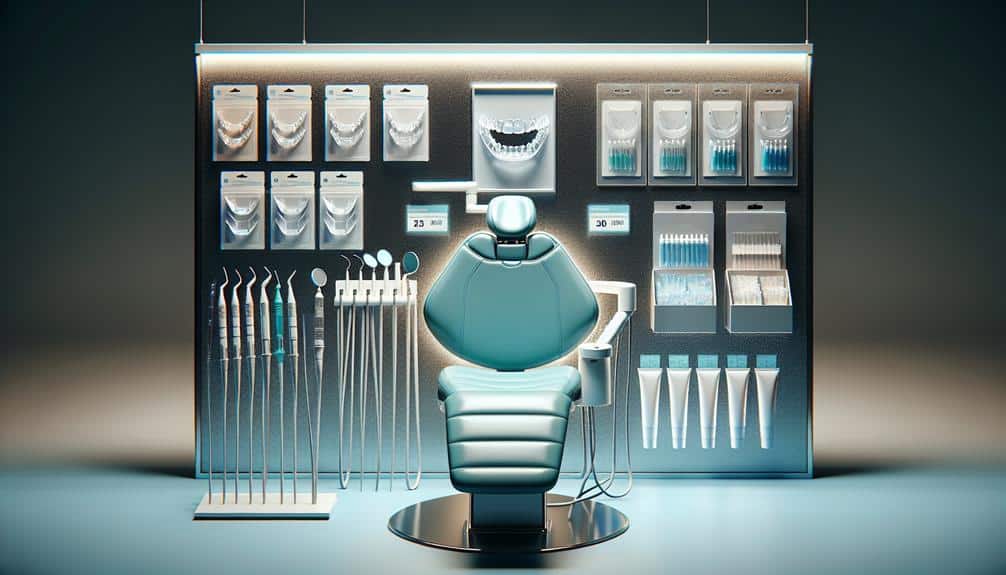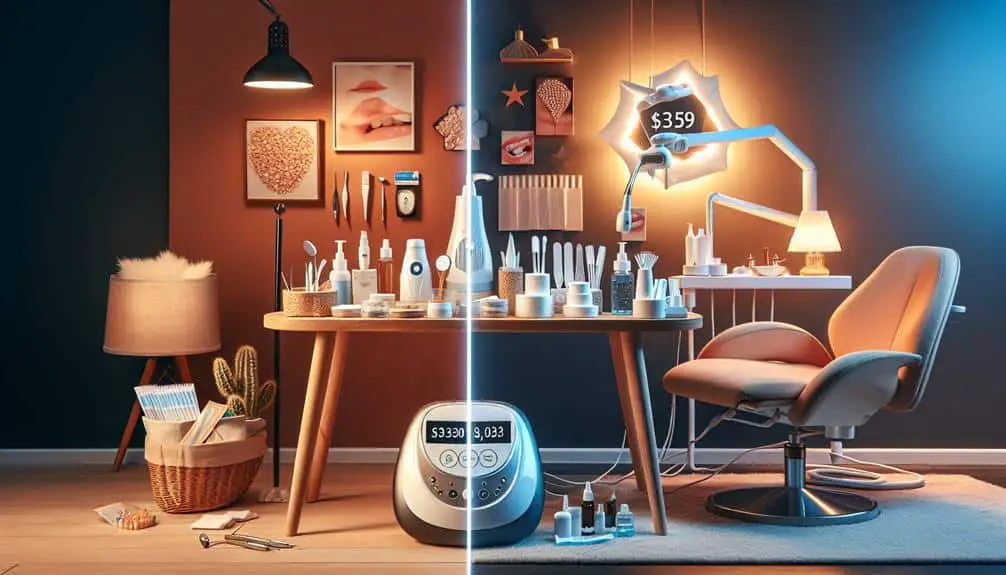When considering teeth whitening costs, you should keep in mind that factors like the treatment type, dental professional's expertise, clinic location, and additional services required play a role in determining the typical price range. In-office treatments generally range from $300 to $1000 or more, depending on factors such as the need for multiple sessions, preferred brands, and additional services like custom trays or desensitizing treatments. If you want to learn more about cost comparisons, additional expenses, and ways to save on teeth whitening, you can explore further details in the provided research.
Key Points
- Average cost ranges from $300 to $1000 or more for in-office treatments.
- Professional treatments offer quicker and more noticeable results.
- DIY methods may require multiple rounds for similar results.
- Additional costs include maintenance, follow-up visits, and aftercare products.
- Ways to save include DIY kits, discounts, and natural remedies like baking soda.
Factors Influencing Teeth Whitening Costs
Factors that influence the cost of teeth whitening include the type of treatment chosen, the location of the dental clinic, and the expertise of the dental professional performing the procedure. The treatment duration and effectiveness play a significant role in determining the overall cost. Some treatments require multiple sessions or specialized procedures, which can increase the total expenses. Additionally, the location of the dental clinic affects pricing, with urban areas typically charging higher fees compared to rural settings due to higher overhead costs.
Moreover, the reputation and experience of the dental professional conducting the teeth whitening procedure impact the cost. Established professionals with a track record of successful treatments may charge more for their services. They're often sought after for their expertise, which can justify the higher prices. It's crucial to take into account these factors when deciding on a teeth whitening treatment, as they can influence both the quality of the results and the final cost incurred.
Average Cost of In-Office Treatments
When contemplating in-office teeth whitening treatments, the average cost can vary depending on the specific procedure chosen and the location of the dental clinic. In-office teeth whitening procedures are typically more expensive than at-home kits due to the professional supervision and quality of the treatment. The cost variations for in-office treatments are influenced by factors such as the type of whitening procedure, the expertise of the dentist, and the location of the dental clinic. Popular brands offering in-office teeth whitening treatments often have higher costs associated with their services.
Here are some key points to ponder regarding the average cost of in-office teeth whitening treatments:
- The cost can range from $300 to $1000 or more.
- Some procedures may require multiple sessions, increasing the overall cost.
- High-end dental clinics in metropolitan areas may charge more for these treatments.
- Popular brands like Zoom, Philips Zoom, and Opalescence may have higher costs.
- Additional services such as custom mouth trays or desensitizing treatments may also add to the total cost.
Cost Comparison: Professional Vs. DIY Methods
Comparing the costs of professional in-office teeth whitening treatments with DIY methods reveals significant differences in both effectiveness and price. Professional treatments often deliver quicker and more noticeable results compared to home remedies. While the initial cost of professional whitening may be higher, the long-term savings can outweigh the expenses.
Professional treatments guarantee professional results by using high-concentration bleaching agents that penetrate the enamel to remove deep stains effectively. On the other hand, home remedies like baking soda or activated charcoal may show slower results and mightn't be as effective at removing tough discoloration.
When considering the cost comparison, examining the upfront investment of professional whitening against the potential need for multiple rounds of DIY treatments to achieve similar outcomes is crucial. Although professional treatments may seem more expensive initially, their efficiency and effectiveness can lead to better results in a shorter period, potentially saving you time and money in the long run.
Additional Costs to Consider
Take into account the potential expenses beyond the initial treatment when evaluating the overall cost of teeth whitening procedures. While the upfront cost may seem straightforward, there are additional factors to keep in mind to maintain your bright smile effectively.
Here are some key expenses to keep in mind:
- Maintenance expenses and follow-up visits: Regular visits to your dentist may be necessary to maintain your teeth whitening results over time.
- Aftercare products: Investing in quality toothpaste, mouthwash, and whitening strips recommended by your dentist can contribute to the longevity of your whitening treatment.
- Touch-up treatments: Depending on the whitening method used, occasional touch-up treatments may be needed to keep your smile looking its best.
- Potential sensitivity treatments: Some individuals may experience tooth sensitivity after whitening treatments, requiring additional products or treatments to manage discomfort.
- Customized trays or additional products: Certain methods of teeth whitening may require personalized trays or additional products for best results.
Ways to Save on Teeth Whitening Costs
To optimize your budget while maintaining a radiant smile, exploring cost-effective strategies for teeth whitening can be advantageous.
When considering ways to save on teeth whitening costs, at-home solutions and budget-friendly options are key. One cost-effective approach is to opt for DIY teeth whitening kits that can be purchased over the counter. These kits typically include whitening gel and trays that can be used conveniently at home. Another budget-friendly option is to look for discounts or promotions offered by dental offices or reputable online retailers. Many times, these discounts can help you save a substantial amount on professional teeth whitening services.
Moreover, incorporating simple habits like regular brushing, flossing, and avoiding teeth-staining foods and drinks can prolong the effects of whitening treatments, reducing the frequency of touch-ups needed. Additionally, considering natural remedies like baking soda or hydrogen peroxide can be a cost-efficient way to maintain a bright smile.
Frequently Asked Questions
Are There Any Long-Term Side Effects or Risks Associated With Teeth Whitening Treatments?
When thinking about teeth whitening, it's important to be aware of potential long-term effects and risks. Consult with your dentist to explore treatment options and alternatives to minimize any potential negative impacts on your oral health.
How Often Do People Typically Need to Get Their Teeth Whitened to Maintain Results?
To maintain teeth whitening results effectively, people typically need touch-ups every 6-12 months. DIY options like whitening toothpaste can help prolong results between treatments. Consistent oral hygiene and avoiding staining substances aid in lasting brightness.
Can Teeth Whitening Treatments Be Covered by Dental Insurance?
Understanding dental insurance coverage for teeth whitening can be complex. Policies often have restrictions, making out-of-pocket costs a worry. Grasping your plan's details is crucial to determine affordability and potential reimbursement options.
Are There Any Specific Factors That May Make Teeth Whitening Treatments More Expensive for Certain Individuals?
When it comes to teeth whitening, several factors can drive up the cost for some individuals. Factors like the type of treatment, extent of discoloration, and additional services needed can impact affordability. Prioritize based on your needs and budget constraints.
Are There Any Alternative Methods or Treatments for Teeth Whitening That May Be More Cost-Effective?
Looking for cost-effective ways to whiten your teeth? Home remedies like baking soda and hydrogen peroxide can be effective. Consider professional whitening for quicker results, but DIY methods can also brighten your smile.



